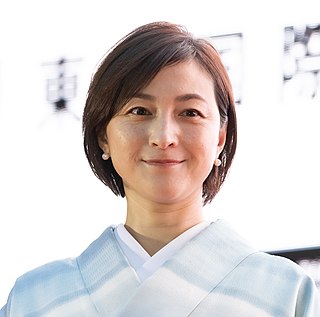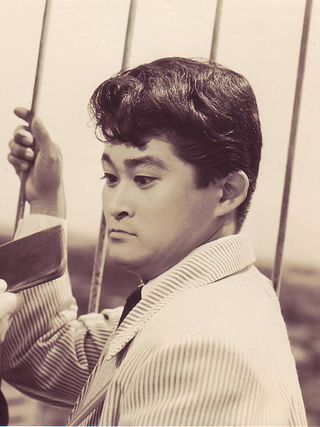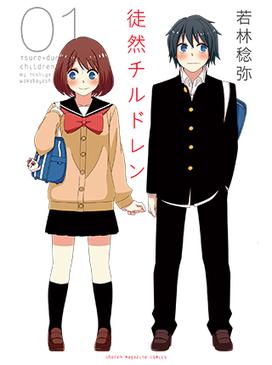Related Research Articles
Koichi Domoto is a Japanese idol, singer, actor, singer-songwriter, composer, lyricist, television personality, voice actor. Along with Tsuyoshi Domoto, he is a member of the duo KinKi Kids, who holds the Guinness World Records for having the most consecutive No.1 singles since debut and the most consecutive years with a Japanese No.1 single, and is one of the top 20 best-selling artists of all time in Japan.
Tsuyoshi Domoto is a Japanese idol, singer, songwriter, actor, and television personality. Along with Koichi Domoto, he is a member of KinKi Kids, which is a Japanese duo under the management of Johnny & Associates and the record holder of Guinness World Records for having the record of the most consecutive number-one singles since their debut single.

Ryōko Hirosue is a Japanese actress and singer, best known to international audiences for her roles in the Luc Besson-produced Wasabi and the Academy Award-winning Japanese film Departures. She also starred in the 2008 comedy series Yasuko to Kenji.

Wasabi is a 2001 French action comedy film directed by Gérard Krawczyk and written and produced by Luc Besson. The film stars Jean Reno, Michel Muller and Ryōko Hirosue. In France, it was released as Wasabi, la petite moutarde qui monte au nez.
"SHOCK" (ショック) is a series of musical works starring Domoto Koichi, who is also in charge of the planning, music, story, and production under Johnny Kitagawa’s direction. SHOCK was originally based on the musical "PLAYZONE '91 SHOCK", and premiered at the Imperial Theater in November 2000 under the title "MILLENNIUM SHOCK". It has been performed at the same theater every year since, with different modifications in the title, cast, plot and programs each year. In 2005, it was revamped entirely as “Endless SHOCK”, which has been its title until now. SHOCK's annual performances are greatly anticipated, and it is dubbed “the stage of which tickets are the hardest to get in Japan” by the media.

Miki Nakatani is a Japanese actress and singer who began her professional career as a member of the girl group Sakurakko Club. Nakatani focused on acting after her departure from the band, making her debut on the popular television drama Under One Roof.

Kyō no Go no Ni is a Japanese seinen manga series created by Koharu Sakuraba, the author of Minami-ke. It was originally serialized in Kodansha's Bessatsu Young Magazine from 2002 to 2003, and the twenty-two chapters were later collected together in a single tankōbon volume along with two extra chapters and published on November 11, 2003, by Kodansha. The main premise of Kyō no Go no Ni is the school life of the fifth year class 5-2, focusing on an elementary-school boy named Ryōta Satō.
KinKi Kids is a Japanese duo consisting of Koichi Domoto and Tsuyoshi Domoto under the talent agency Johnny & Associates. KinKi Kids was formed in 1993 and officially debuted on July 21, 1997. With more than 30 million physical copies sold, they are one of the best selling boy groups in Asian history and top 20 best-selling artists of all time in Japan. Although the members share the same surname, the only relation they have to each other is that they both hail from the Kinki region, hence the duo's name.

Frankie Sakai was a Japanese comedian, actor, and musician.

The Okami-san series is a collection of Japanese light novels by Masashi Okita, with illustrations by Unaji. The series started with the release of the first volume in August 2006 titled Okami-san & her Seven Companions, and as of January 2011, 12 volumes have been published by ASCII Media Works under their Dengeki Bunko imprint. A manga adaptation by Kurumi Suzushiro started serialization in the April 2010 issue of ASCII Media Works' shōnen manga magazine Dengeki Daioh. A 12-episode anime adaptation by J.C.Staff aired in Japan on AT-X between July 1 and September 16, 2010, and has been licensed and dubbed into English by Funimation Entertainment to be aired on American network television and released to DVD. The English-dubbed version of the anime adaptation was subsequently licensed and distributed by Madman Entertainment and Manga Entertainment to Australia and the United Kingdom, respectively.

"Sakura no Shiori" is the 15th single by Japanese idol girl group AKB48; it was released on February 17, 2010. The title track is a school graduation song. The song was used as the theme song to the AKB48-related drama Majisuka Gakuen, which stars Atsuko Maeda and many members from AKB48 and its sister groups.

"Amagasa" is a song by Japanese band Tokio. It was one of the two A-sides that composed the band's 39th single, along with the song "Akireru Kurai Bokura wa Negaō". The single was released on September 3, 2008, and was their first release with J Storm. "Amagasa" was written by Japanese rock musician Ringo Sheena. In 2014, Sheena covered the two songs she wrote for the single, "Amagasa" and "Kachū no Otoko", for her album Gyakuyunyū: Kōwankyoku.
"Private" is a song by Japanese entertainer Ryōko Hirosue, written by Ringo Sheena. It was released as the B-side to her fourth single "Jeans" on October 7, 1998, and was the title track of her second studio album Private (1999). Hirosue performed it on her first live tour in February 1999. The Budokan performance on February 7, 1999 was released as a CD/DVD set called Hirosue Ryoko First Live: RH Debut Tour 1999 on May 26, 1999. "Private" was also featured on both of Hirosue's greatest hits albums: RH Singles &... (1999) and Hirosue Ryoko Perfect Collection (2002).

Super Lovers is a Japanese yaoi manga series published in the magazine Emerald by Miyuki Abe, author of Hakkenden: Eight Dogs of the East. An anime adaptation premiered in April 2016. A second season premiered in January 2017.

Tsuredure Children is a Japanese four-panel manga written and illustrated by Toshiya Wakabayashi. It was serialized in Kodansha's Bessatsu Shōnen Magazine from August 2014 to March 2015, and transferred to Weekly Shōnen Magazine, where it ran from April 2015 to July 2018. It was compiled into twelve tankōbon volumes.
References
- ↑ Clements, Jonathan; Tamamuro, Motoko (2003). The Dorama Encyclopedia: A Guide to Japanese TV Drama Since 1953. Stone Bridge Press. pp. 296–297. ISBN 9781880656815.